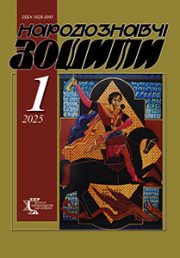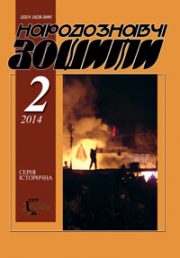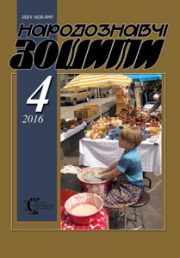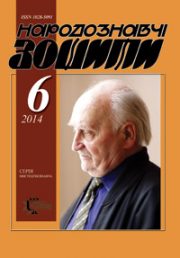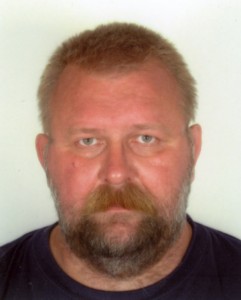Roman Radovych
Our authors
On bessarabian and moldavian ukrainians in the studies of historical ethnography
The article has thrown some light upon a sum of scientific findings got during XIX to XXI cc. in historio-ethnographic studies of Bessarabia and Moldavian Ukrainians. In the present paper has been given author’s answer to the problem of lacking progress as for the numerous themes concerning Ukrainians. State and achievements of the research-works in Ukrainians’ material and spiritual culture by the scientists of Moldavia and Ukraine through the years of independence has been exposed.
Read »
The article has thrown some light upon a sum of scientific findings got during XIX to XXI cc. in historio-ethnographic studies of Bessarabia and Moldavian Ukrainians. In the present paper has been given author’s answer to the problem of lacking progress as for the numerous themes concerning Ukrainians. State and achievements of the research-works in Ukrainians’ material and spiritual culture by the scientists of Moldavia and Ukraine through the years of independence has been exposed.
Read »
Daily bread baking of ukrainians in the south-western ethnographical region at the late XIX to early XXI cc.
The paper has dealt with analytic study in prescriptions, signs, customs, methods, ways of selection, procurement and some peculiarities in usage of subsidiary means — water, firewood and leaves in bread baking. The final aim of the mentioned actions had been (and still is) selection of the means and ingredients fit, by their characteristics, for the backing of bread. The paper has demonstrated dependence of bread backing subsidiary means criteria from the folk nutritional standards and world outlook stereotypes as well as from regional social and economic, natural and geographical factors and peculiarities of material culture.
Read »
The paper has dealt with analytic study in prescriptions, signs, customs, methods, ways of selection, procurement and some peculiarities in usage of subsidiary means — water, firewood and leaves in bread baking. The final aim of the mentioned actions had been (and still is) selection of the means and ingredients fit, by their characteristics, for the backing of bread. The paper has demonstrated dependence of bread backing subsidiary means criteria from the folk nutritional standards and world outlook stereotypes as well as from regional social and economic, natural and geographical factors and peculiarities of material culture.
Read »
Maternity ritualism by volhynians in publications of the second half XIX to the early XXI cc.
In the article have been considered some basic landmarks for fixing and publication of ethnographic materials on the maternity rites of Volhynia with analytical study in ritual elements, their kinds and territories of origin. The article has also raised a problem of gaps in studies of maternity rites of Ukrainian historio-ethnographic Volhynia.
Read »
In the article have been considered some basic landmarks for fixing and publication of ethnographic materials on the maternity rites of Volhynia with analytical study in ritual elements, their kinds and territories of origin. The article has also raised a problem of gaps in studies of maternity rites of Ukrainian historio-ethnographic Volhynia.
Read »
Wax candle as ukrainian Christmas and epiphany ritualistic text
For the first time in native ethnology the article has brought some results of special study in sign functionality of a wax candle under the context of Ukrainian Christmas and Epiphany ritualistic text (ritualism of Christmas Eve, New Year, Epiphany Eve and Feast of Epiphany). The study has stated extremely high semiotic position of a wax candle as projection of Sun, mediator between the spheres of sacral and prophane elements, symbolic analogue of human existence, apotropy, cultural symbol re-establishing borders of acculturated space.
Read »
For the first time in native ethnology the article has brought some results of special study in sign functionality of a wax candle under the context of Ukrainian Christmas and Epiphany ritualistic text (ritualism of Christmas Eve, New Year, Epiphany Eve and Feast of Epiphany). The study has stated extremely high semiotic position of a wax candle as projection of Sun, mediator between the spheres of sacral and prophane elements, symbolic analogue of human existence, apotropy, cultural symbol re-establishing borders of acculturated space.
Read »
